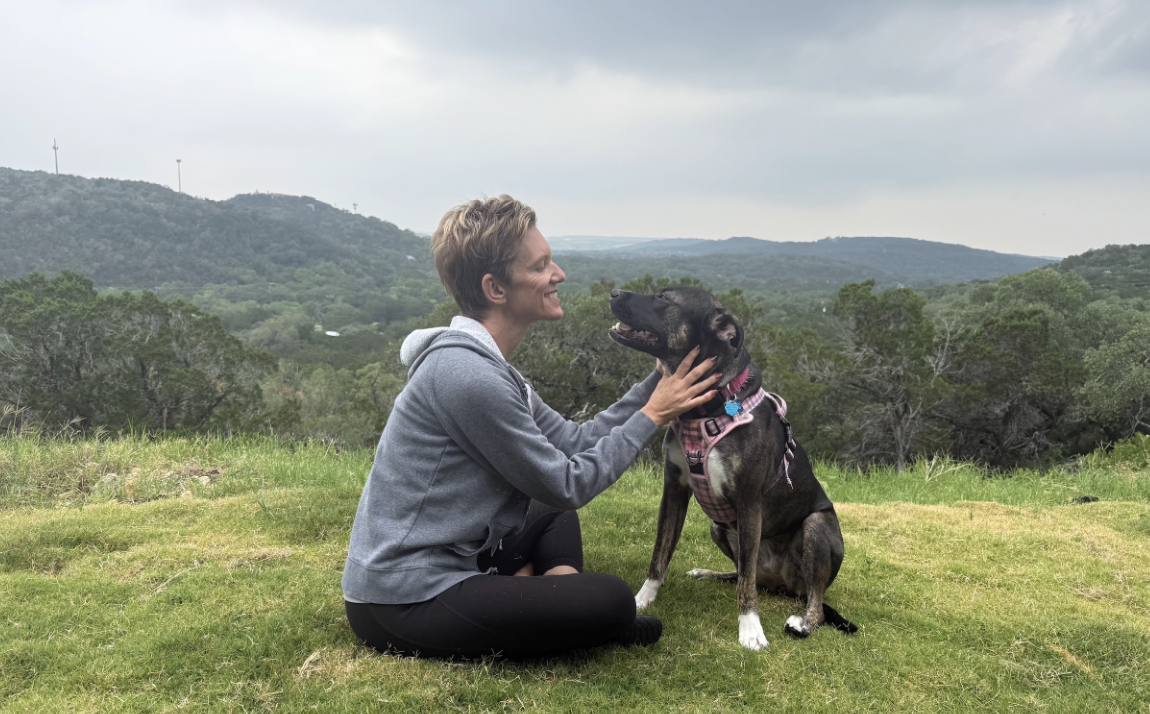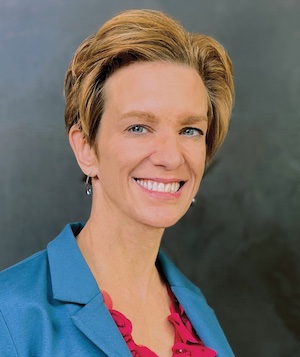In April, Amber Elaine Cox became Phi Beta Kappa’s new Associate Secretary and COO. Prior to joining our national office, Cox served for nine years as Executive Director of the Council of Colleges of Arts & Sciences (CCAS) and spent a decade as Associate Director of the Big Ten Academic Alliance. Shortly after her arrival, our staff interviewed Cox about her career, ΦBK’s mission, and her vision for the future.
PHI BETA KAPPA: What inspired you to take on this role at Phi Beta Kappa, and what parts of the Society’s mission speak to you?
AMBER ELAINE COX: I’ve always been drawn to organizations that champion the liberal arts and sciences, and Phi Beta Kappa’s mission resonates deeply with my own values. The commitment to fostering curiosity, critical inquiry, and intellectual integrity felt like a natural extension of my previous work at CCAS. What truly inspired me, though, was the opportunity to help shape how we connect those ideals to action—through people, partnerships, and programs. I saw real potential to bring strategic clarity, operational support, and a spirit of collaboration to a mission that matters.

Amber Elaine Cox with her dog Milky Mittens. Based in San Antonio, Cox and her husband are empty nesters who enjoy world travel and foster pregnant, nursing, and orphaned stray dogs for area rescue organizations.
ΦBK: Your career spans a wide range of leadership roles in higher education and the nonprofit sector. What through line connects those experiences to your work now at Phi Beta Kappa?
AEC: The consistent thread through all my roles has been a passion for connecting people to purpose—and to one another. Whether I was working with deans at CCAS or volunteers and donors in previous nonprofit roles, I’ve focused on bringing out the strengths in others and finding creative, often cross-silo solutions. I enjoy translating vision into action and making systems work better so that people can do their best work. That’s exactly what I’m doing now at ΦBK—helping the organization thrive behind the scenes so its mission can shine even brighter out front.
ΦBK: You led the Council of Colleges of Arts & Sciences through a time of major change, including virtual innovation during the pandemic. What lessons from that experience are you bringing with you to ΦBK?
AEC: The pandemic underscored the importance of agility, empathy, and intentional communication. At CCAS, we had to rethink how we connected our community and provided value—and we did it by listening closely, experimenting boldly, and not being afraid to pivot. I’m bringing that same mindset to ΦBK: a willingness to ask, “What do our members really need right now?” and “How might we meet that need in creative and human-centered ways?” Also, I learned that inclusive leadership—where everyone feels seen and heard—isn’t a “nice to have.” It’s essential for navigating change well.
ΦBK: What are some of your immediate priorities in your first months as Associate Secretary and COO?
AEC: My first priority is getting to know the people—our team, our partners, our chapters, our members—so I can understand what’s working, where the friction points are, and where we have momentum. I’m also focused on strengthening internal systems and aligning resources with strategic goals, so we can deliver value more efficiently and creatively. And I’m asking questions: How can we support chapters and associations more meaningfully? Where can we remove barriers or unlock opportunities? I believe early listening leads to smarter action.
ΦBK: How do you see Phi Beta Kappa’s national office evolving to find new ways to support its chapters, associations, and members?
AEC: I see the national office becoming an even stronger hub of connection, innovation, and support. That might look like reimagining how we share resources across the network, developing flexible tools that chapters and associations can adapt to local needs, or creating new pathways for members to engage across geography or life stage. I also think we can be more proactive in surfacing and amplifying great ideas from the field. My goal is to help build an office culture that’s responsive, collaborative, and joyful to work with—because when we show up that way, it makes everything else easier.
ΦBK: Phi Beta Kappa celebrates excellence in the arts and sciences. How do you see upcoming work at the national office aligning with and amplifying that mission?
AEC: As ΦBK approaches its 250th anniversary, we have a unique opportunity to both honor our legacy and reimagine our future. At the national office, we’re focused on amplifying excellence not just through celebration, but through action—by elevating the voices of our members, strengthening chapter support, and building new platforms to engage the public in the value of the liberal arts and sciences. This milestone moment allows us to reflect on how enduring our mission is—and to invest in the programs, partnerships, and innovations that will carry it forward for the next generation.
ΦBK: You’ve led initiatives ranging from brain injury research with major athletic conferences to expanding access to less commonly taught languages, and you’ve held leadership roles in both higher education and nonprofit organizations. How have these diverse experiences shaped your philosophy and approach to organizational leadership?
AEC: What I’ve learned is that great leadership starts with listening and thrives on trust. Whether working with researchers, campus leaders, or cross-sector coalitions, I’ve found that progress happens when you bring people together around shared purpose, clear goals, and mutual respect. I also believe in building cultures that are creative and human-centered—where systems serve people, not the other way around. My experiences across sectors have taught me to lead with curiosity, adapt quickly, and connect people and resources across traditional barriers. That’s the mindset I bring to Phi Beta Kappa.
ΦBK: What does leadership look like to you, especially in mission-driven organizations like the Society?
AEC: Leadership, to me, is about creating the conditions for others to thrive. In mission-driven work, that means being purpose-focused and people-first. It’s about clarity and compassion—communicating vision while fostering inclusion, accountability, and joy in the work. I believe strong leaders cultivate trust, navigate ambiguity with steadiness, and invite others to shape the future alongside them. Especially in times of change, leadership is less about having all the answers and more about asking the right questions, staying grounded in values, and helping teams move forward with confidence.
ΦBK: In your view, why is Phi Beta Kappa’s mission of championing the liberal arts and sciences, fostering freedom of thought, and recognizing academic excellence so vital in higher education today?
AEC: Higher education is under immense scrutiny—from cost and access to the very relevance of a degree. In this environment, Phi Beta Kappa plays a critical role in reminding us why education matters—not just for careers, but for democracy, discovery, and human connection. Our mission affirms that academic excellence isn’t elitist; it’s foundational. It uplifts the pursuit of truth, the power of diverse ideas, and the responsibility of informed citizenship. At a time when misinformation spreads easily and division runs deep, our commitment to intellectual freedom and rigor couldn’t be more essential.
ΦBK: How do you see the liberal arts and sciences equipping students and society to meet the challenges of our time?
AEC: The liberal arts and sciences give us tools we urgently need: the ability to think critically, communicate clearly, collaborate across differences, and make sense of complexity. These aren’t just academic skills—they’re democratic and economic imperatives. In a world facing climate change, global instability, and rapid technological shifts, we need leaders who can synthesize ideas, ask ethical questions, and imagine better futures. That’s the heart of a liberal education. It doesn’t give us easy answers, but it teaches us how to ask better questions—and how to act with both intellect and empathy.
ΦBK: How do you think we could best position Phi Beta Kappa as an organization at a time when many people on and off campus question the value of arts and sciences education, reject academic expertise, and view academic honor societies as elitist and irrelevant?
AEC: We need to lead with relevance, accessibility, and authenticity. That means showing how Phi Beta Kappa’s values translate into real-world impact—through our members, advocacy, and programs. We should highlight diverse member stories, challenge outdated perceptions, and build stronger connections between our chapters and public conversations. We can also partner more deeply across disciplines, institutions, and communities to demonstrate that honoring the life of the mind isn’t a luxury—it’s a necessity. If we position ourselves not as gatekeepers but as bridge builders, we can redefine what excellence means in today’s world.
ΦBK: Finally, if you could share a message with the entire Phi Beta Kappa community as you begin this chapter, what would it be?
AEC: I’d say: This is our moment. In a world full of noise and division, Phi Beta Kappa stands for something timeless and transformative—curiosity, integrity, and the power of ideas to shape a better future. Let’s lean into that mission with boldness and heart. Let’s tell our story more clearly, support one another more deeply, and welcome new voices into our fold. I’m honored to be part of this next chapter, and I’m excited to help us grow—together, with purpose and joy.




